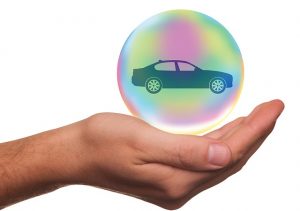The Hidden Costs of Buying Your Dream Car

For many people, cars are just a way for us to get from Point A to Point B. But for others, cars can occupy a special place in our hearts. Maybe even as a kid, you hung up posters of your favorites (for me, it was a Lamborghini Diablo).
Now that you’re an adult making way more than a 13-year-old’s allowance, the idea of owning your dream car is a little less far fetched (well, maybe not the Lambo. That’s still a little rich for my blood.) But even though you can afford the sticker price, you may not be aware of all the potential hidden costs that go into that amazing vehicle. Here are a few things to know before you think of signing on the dotted line.
Reliability
Sports cars are not known as the most durable machines, even when they’re brand new. They are precision pieces of equipment that means little hiccups that wouldn’t bother a normal daily driver can be big trouble on your track day toy. And if your dream make and model is from before the Reagan administration, you’ll want to be even more cautious about its condition before you buy.
Parts
If (or more likely, when) your dream car breaks down, it’s not going to be as easy to fix as your neighbor’s Camry down the street. Finding a mechanic to work on your specialized machinery is going to take some searching, and parts are going to be fewer and farther between. And for those of you not driving something domestic, you could be looking at some expensive shipping costs from foreign countries to get your baby back to being roadworthy.
Rideshares, Taxis And Rentals
And what are you supposed to drive when your car is in the shop? You may end up paying a lot just to sit in other people’s vehicles.
Insurance Premiums for Luxury or High-Performance Cars
Insurance premiums for dream cars can be substantially higher due to their higher value, repair costs, and increased risk of theft. Research insurance options and consider obtaining quotes before purchasing to understand the ongoing financial commitment.
Gas
Here’s one a lot or people forget or don’t take enough into account. That slick little sports car is pretty picky. It’s not going to put up with regular old unleaded. Get ready to shell out 50-100% more at the pump to get the premium gasoline your car requires. And like their durability, sports cars aren’t really known for their fuel economy either, especially if you’re driving them like, well, sports cars. Those costs really add up over time.
Insurance
You knew this one was coming, right? Turns out that driving a car that costs more money and is less safe raises your car insurance rates? Who knew? That being said, there are a lot of car insurance providers and options available to you, so while your premiums might be higher than for a Ford Focus, they don’t have to be through the roof.
Taxes on Luxury Vehicles
Luxury cars often come with higher taxes, not just during the initial purchase but also in the form of annual luxury or luxury vehicle taxes. Be prepared for these additional costs that may vary based on your location and the car’s value.
Security
Now that you have this nice car, where are you going to leave it? Surely not in the driveway where it could get damaged by the elements. Or maybe you live in the city? Are you going to trust that your vehicle won’t be broken into, vandalized or straight up stolen? It only makes sense to have some sort of private parking for your new ride, and that won’t come cheaply.
Storage Costs
Depending on your living situation, storing your dream car securely, especially during adverse weather conditions, may involve renting garage space or investing in a dedicated car storage facility. These expenses contribute to the total cost of ownership.
A Second Vehicle
Oh, here’s an idea: You could have a second car that’s more reliable, has better mileage and has easily available parts. Smart thinking. But at the end of the day, it’s still a whole extra vehicle with its own taxes, parking needs and insurance and those are not insignificant costs.
Look, this may seem like we’re trying to talk you out of your dream, and in some ways, yes, that’s what we’re doing. But more than that, you need to be ready for costs like these so they don’t end up putting you in a bad financial spot down the road. If you just want to go fast, consider purchasing a sport version of a more common car like a Volkswagen Golf GTI or a Honda Civic Type R that’s both fun and less expensive to maintain.
If none of these things swayed you, then getting that classic or sporty car may just be for you. But you should still make sure you’re spending your money wisely. Thoroughly inspect any car you’re considering buying, especially if it’s older. Ask for the car’s history and know which parts are factory stock and which have been replaced over the years. Check the gauges to make sure they’re in working order. Don’t forget to look underneath the car for signs of rust.
Faqs :
Why should I be concerned about the reliability of a sports car when buying my dream car?
Sports cars, especially older models, may have durability issues due to their precision engineering. These vehicles are often less forgiving when it comes to wear and tear, and maintenance can be more challenging and expensive.
How do parts availability impact the hidden costs of owning a dream car?
Parts for dream cars, especially those from niche manufacturers or older models, may be harder to find. Limited availability can lead to increased repair costs, longer wait times, and potential challenges in maintaining your vehicle.
How does using rideshares, taxis, or rentals contribute to the overall costs of owning a dream car?
When your dream car is in the shop for repairs or maintenance, relying on alternative transportation options can result in additional expenses. Costs associated with rideshares, taxis, or rental cars during these periods should be considered in your overall transportation budget.
Why is the cost of gasoline higher for sports cars, and how does it impact the overall budget?
High-performance cars often require premium gasoline, which is more expensive than regular unleaded fuel. Additionally, sports cars, especially when driven aggressively, tend to have lower fuel efficiency, leading to increased fuel expenses over time.
How do insurance premiums vary for dream cars, and what factors contribute to the higher costs?
Insurance premiums for dream cars are typically higher due to factors such as the car’s higher value, repair costs, and increased risk of theft. Researching insurance options and obtaining quotes before purchase helps understand the ongoing financial commitment.
What are personal property taxes, and how do they impact the overall cost of owning a dream car?
Personal property taxes are taxes levied on personal possessions, including luxury vehicles. Dream cars may be subject to higher personal property taxes, impacting the overall cost of ownership.
Why is additional security necessary for dream cars, and how does it contribute to hidden costs?
High-value dream cars may require additional security measures to protect against theft or vandalism. Investing in advanced alarm systems, GPS tracking, or secure parking spaces adds to the overall ownership costs.
How does owning a second vehicle impact the hidden costs associated with dream cars?
While a second, more practical vehicle can provide a reliable daily driver, it introduces additional costs such as insurance, maintenance, and parking. These extra expenses should be considered when budgeting for dream car ownership.
What kind of customization and upgrades should I budget for when buying a dream car?
Enthusiasts often want to personalize their dream cars with modifications, aesthetic changes, or additional features. Budget for both upfront costs and potential impacts on resale value when considering customization and upgrades.
Why is storage cost a consideration for dream car owners, and what options are available?
Storing your dream car securely, especially in adverse weather conditions, may involve additional costs such as renting garage space or investing in a dedicated car storage facility. These expenses contribute to the overall cost of ownership.






